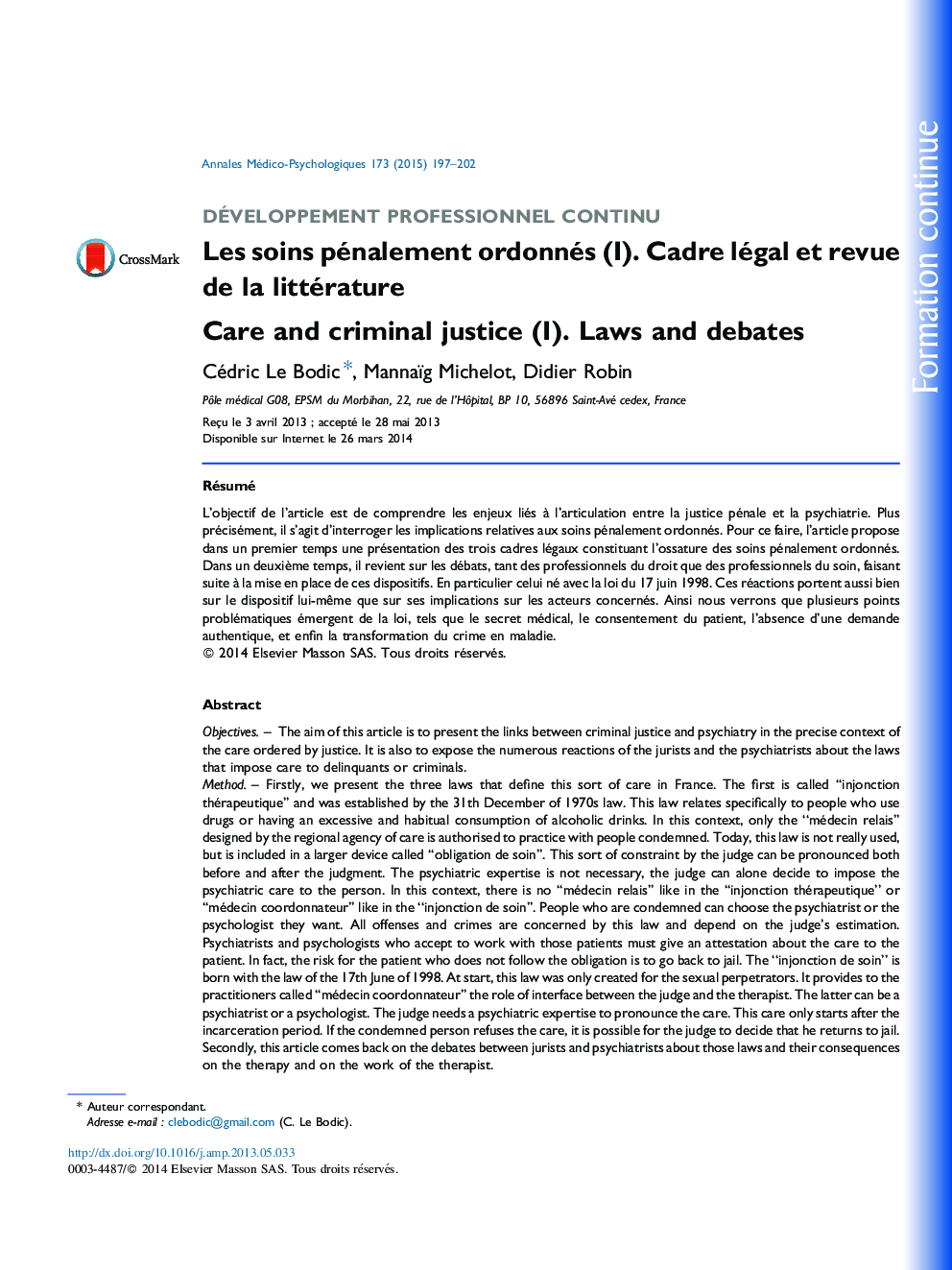| کد مقاله | کد نشریه | سال انتشار | مقاله انگلیسی | نسخه تمام متن |
|---|---|---|---|---|
| 314725 | 534722 | 2015 | 6 صفحه PDF | دانلود رایگان |

RésuméL’objectif de l’article est de comprendre les enjeux liés à l’articulation entre la justice pénale et la psychiatrie. Plus précisément, il s’agit d’interroger les implications relatives aux soins pénalement ordonnés. Pour ce faire, l’article propose dans un premier temps une présentation des trois cadres légaux constituant l’ossature des soins pénalement ordonnés. Dans un deuxième temps, il revient sur les débats, tant des professionnels du droit que des professionnels du soin, faisant suite à la mise en place de ces dispositifs. En particulier celui né avec la loi du 17 juin 1998. Ces réactions portent aussi bien sur le dispositif lui-même que sur ses implications sur les acteurs concernés. Ainsi nous verrons que plusieurs points problématiques émergent de la loi, tels que le secret médical, le consentement du patient, l’absence d’une demande authentique, et enfin la transformation du crime en maladie.
ObjectivesThe aim of this article is to present the links between criminal justice and psychiatry in the precise context of the care ordered by justice. It is also to expose the numerous reactions of the jurists and the psychiatrists about the laws that impose care to delinquants or criminals.MethodFirstly, we present the three laws that define this sort of care in France. The first is called “injonction thérapeutique” and was established by the 31th December of 1970s law. This law relates specifically to people who use drugs or having an excessive and habitual consumption of alcoholic drinks. In this context, only the “médecin relais” designed by the regional agency of care is authorised to practice with people condemned. Today, this law is not really used, but is included in a larger device called “obligation de soin”. This sort of constraint by the judge can be pronounced both before and after the judgment. The psychiatric expertise is not necessary, the judge can alone decide to impose the psychiatric care to the person. In this context, there is no “médecin relais” like in the “injonction thérapeutique” or “médecin coordonnateur” like in the “injonction de soin”. People who are condemned can choose the psychiatrist or the psychologist they want. All offenses and crimes are concerned by this law and depend on the judge's estimation. Psychiatrists and psychologists who accept to work with those patients must give an attestation about the care to the patient. In fact, the risk for the patient who does not follow the obligation is to go back to jail. The “injonction de soin” is born with the law of the 17th June of 1998. At start, this law was only created for the sexual perpetrators. It provides to the practitioners called “médecin coordonnateur” the role of interface between the judge and the therapist. The latter can be a psychiatrist or a psychologist. The judge needs a psychiatric expertise to pronounce the care. This care only starts after the incarceration period. If the condemned person refuses the care, it is possible for the judge to decide that he returns to jail. Secondly, this article comes back on the debates between jurists and psychiatrists about those laws and their consequences on the therapy and on the work of the therapist.ResultsThis reaction concerned both the device of these laws and its consequences about the actors concerned (judges, doctor, therapists, condemned person). We will show that four points of debate emerge: The medical secret, the consent, the real or pure task of the patient and the belief that all criminals are crazy.
Journal: Annales Médico-psychologiques, revue psychiatrique - Volume 173, Issue 2, March 2015, Pages 197–202